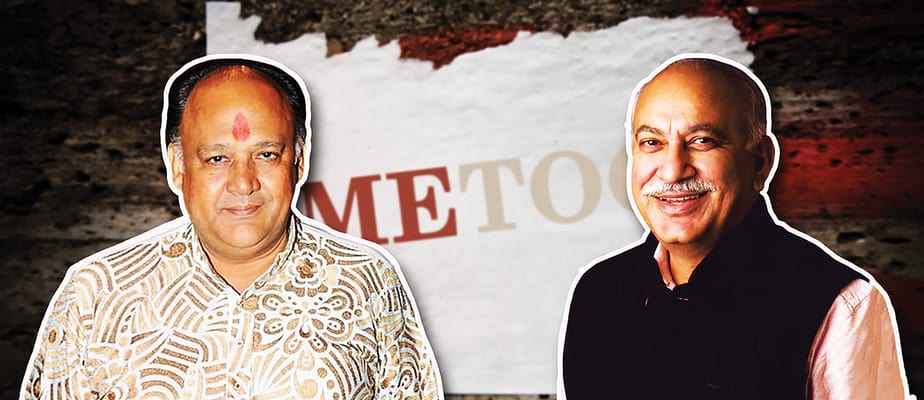
Tens of thousands of posts on social media and a record 10 days of the news cycle has been devoted to developments on the many high-profile men named this past week as sexual harassers in academia, news media and entertainment.
The latest is the defamation suits filed by Union minister MJ Akbar and actor Alok Nath against some of their accusers. A significant number of those who support the movement are unfazed by these suits—many are furious that men who are accused of sexual harassment are litigating against survivors. Defamation suits have little to do with restoring lost reputation. It is used to silence voices of dissent, curb free speech or, in this case, scare survivors of sexual violence into never coming out and naming their abusers.
Powerful people and companies have used Strategic Litigation Against Public Participation (SLAPP) suits to silence critics for several years now. The intent is to force individuals to back off, shut up and/or apologise and the method is usually through frivolous litigations alleging defamation (sometimes in multiple fora). SLAPP suits prey on an unequal power equation with the threatening party having greater clout and money.
The debate on SLAPP suits in the context of sexual harassment in India began in 2013 when a former judge was accused of sexually harassing their intern. It was immediately shut down because of the SLAPP suit that prevented anybody from ever taking their name or even reporting on proceedings.
Defamation is defined in Section 499 of the Indian Penal Code as any statement that is published to lower another person’s reputation. Section 500 prescribes the punishment: civil defamation carries a fine and sometimes a court order mandating an apology or retraction, and criminal defamation carries a fine and/or a two-year imprisonment. Section 499 lists multiple exceptions to defamation but they broadly make up these three types: (a) a true statement, (b) an opinion made in good faith, and (c) a privileged communication (between lawyers and clients, doctors and patients, between spouses, or said in Parliament).
In determining if there truly has been defamation, the truth and bonafide intent of survivors are easier to prove than an intangible loss of reputation. MJ Akbar has sued Priya Ramani of criminal defamation and he will therefore be subjected to a cross-examination by her lawyers. He will be asked a series of questions to see if this “lie” really was able to grow legs and become so sentient that it could inhabit the minds of 16 separate women. This will not be easy for him.
That said, very few defamation cases go to trial, and that is precisely the play here as with any SLAPP suit. It is to intimidate and cause fear, to force an apology through the threat of long-winded and expensive litigation. The defamation suit filed by Alok Nath, for instance, in which he is seeking ₹1 in damages is a transparent effort to harass survivors into silence.
A lot of debate yesterday centred around the 97 lawyers listed on the vakalatnama for MJ Akbar’s petition. A vakalatnama is a form signed by the person filing a suit (a plaintiff) naming the lawyers who will represent them. As the document that is being circulated shows, the plaintiff appoints an advocate to perform everything associated with their suit—from arguing their case to clerical duties such as filing/collecting documents as necessary. Multiple names are listed on the vakalatnama to facilitate the practice where junior lawyers take care of much of the preliminary work in litigations.
The high courts and Supreme Court designate certain advocates as senior advocates who are allowed to command large fees for their considerable experience and skill. They are not permitted to sign a vakalatnama but while junior advocates perform the bulk of drafting and filing, seniors deliver oral arguments in court. There is no doubt that MJ Akbar will engage several senior advocates (assisted by 97 advocates) to intimidate, if nothing else. To list so many names in the vakalatnama—when it is common knowledge that senior advocates will argue the main stages of this suit—is a clever legal strategy but ultimately just bluster.
This shouldn’t discourage women and other gender minorities from calling out abusers and taking legal action against sexual harassment they have experienced. The clock really has run out on the sexist and misogynistic status quo. People are coming together to fight these battles in unprecedented ways, with many individuals offering legal assistance within days of the new accusations. It is extremely unlikely that these threats will succeed in a time when we are all acutely aware of our rights, and when survivors of decades of toxic and hostile workplaces (and their allies) are emboldened in a wave of solidarity and
support.
www.newslaundry.com
Youth shot dead by bike-borne attackers while returning from marriage function; police recover cartridges, begin…
Arunachal women allege racial slurs and humiliation by neighbours over repair work dispute; police register…
The magistrate said the probe reveals that multiple associates could be absconding, which could tamper…
The cylinder blast injured six police and fire personnel deployed at the house where a…
Multiple operational teams have been deployed to probe the case. Crime and Forensic Science Laboratory…
The initiative focused on a victim-centric approach and aimed at strengthening public trust through proactive…